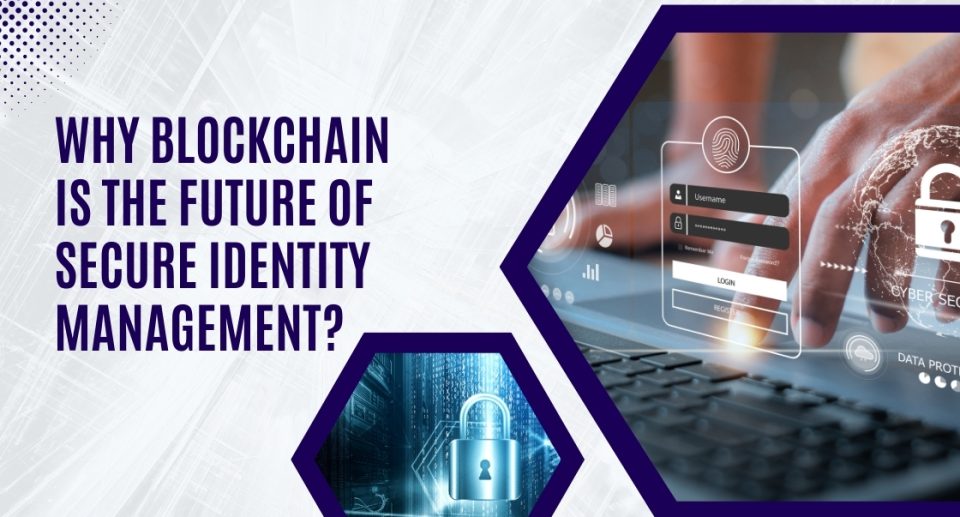In our increasingly digital world, protecting our identities online has become more important than ever. As more of our personal information is shared, stored, and accessed on the internet, the risk of identity theft, fraud, and misuse grows. Traditional methods of managing digital identities, such as passwords and centralized databases, have shown their vulnerabilities. This is where blockchain technology steps in as a game-changer.
What is Blockchain?
Blockchain is a decentralized and distributed ledger technology that securely records transactions across multiple computers in a network. Unlike traditional systems, where data is stored in a central database controlled by a single entity, blockchain stores information across a network of nodes, ensuring that no one entity has control over the entire system. Each piece of information is stored in “blocks,” which are linked together chronologically to form a chain. Blockchain’s most well-known application is in cryptocurrencies like Bitcoin, but its potential extends far beyond digital currencies.
The Challenges of Traditional Identity Management
The challenges of traditional identity management can cause significant problems in keeping personal information secure and private in today’s digital world. Many people use online Here’s a detailed look at the most common challenges:
1. Centralized Databases
Traditional identity management systems store all user information in centralized databases, meaning that all personal data is kept in one location, usually on a server controlled by a company, organization, or government. If hackers gain access to this central database, they can potentially steal millions of users’ personal information at once.
2. Lack of User Control
In traditional systems, users do not have complete control over their personal information. Once you provide your data to a company or organization, they store and manage it without giving you much say over how it’s used or shared. Organizations have the authority to change, limit, or revoke access to your account without your consent. This means that your digital identity is in their hands, not yours.
3. Weak Security
Traditional identity management systems often rely on passwords as the primary method of security. However, passwords are one of the weakest forms of protection. Many people use simple, easy-to-guess passwords or reuse the same password across multiple accounts. This makes it easier for hackers to gain access to accounts through methods like phishing or brute-force attacks.
4. Frequent Data Breaches
Data breaches have become a common occurrence, especially with the rise of digital services. When companies store large amounts of user data in a central location, they become prime targets for hackers. Cybercriminals can exploit weaknesses in a company’s security to steal sensitive information, which may include personal details, login credentials, and even payment information.
5. Repeated Identity Verification
Traditional identity management systems require users to verify their identity repeatedly with different organizations. For example, you may have to upload your ID to open a bank account, apply for a loan, or even register on an e-commerce website. This process is not only time-consuming, but it also involves submitting the same information multiple times to different parties.
6. Privacy Concerns
Privacy is a growing concern in the digital age. Many organizations collect more personal information than they need, creating unnecessary risks for users. For instance, some websites or apps require you to provide a lot of personal details just to sign up, even though they don’t need all that information to deliver their services.
7. High Operational Costs
Managing and securing large databases of user identities comes with significant costs for organizations. Companies must invest heavily in security infrastructure to protect sensitive data from hackers, regularly update their systems to patch vulnerabilities, and comply with data protection regulations. Failure to meet these requirements can result in fines, lawsuits, and damage to the company’s reputation.
How Blockchain Solves These Problems
Blockchain offers a decentralized and secure alternative to the way we manage identities. Here’s how it solves the key issues of traditional identity management:
1. Decentralization
In a blockchain-based system, your identity is not stored in one central database. Instead, it is distributed across a network of computers, making it much harder for hackers to access or alter your information. Even if one part of the network is compromised, the rest of the network remains secure, providing better protection against data breaches.
2. Security and Encryption
Blockchain uses advanced cryptography to secure data. When you create a digital identity on the blockchain, it’s encrypted and stored in a way that only you, the owner, can access it. You control your private key, which is like a password, but much more secure. Without this private key, no one else can access or modify your identity data.Since each block is linked to the previous one, altering one block would require changing every subsequent block in the chain.
3. User Control and Ownership
One of the most significant advantages of blockchain-based identity management is that it puts you in control of your own identity. In traditional systems, your identity is controlled by the organization that stores your data. With blockchain, you own your digital identity, and you decide who can access your information.
4. Privacy and Anonymity
Blockchain also offers enhanced privacy for users. In traditional systems, your personal information is often stored in plain text, meaning that it can be easily accessed by unauthorized parties. With blockchain, your data is encrypted, and you can remain anonymous while proving your identity.For example, if you need to prove you’re over 18 to access a service, blockchain allows you to verify your age without revealing your name, address, or other sensitive details.
5. Reduced Risk of Identity Theft
By storing your identity in a secure, decentralized system, blockchain reduces the chances of your information being stolen or misused. In traditional systems, hackers can easily steal identities by gaining access to a central database. With blockchain, there’s no single point of failure, making it much harder for cybercriminals to launch successful attacks.
The Current Trends and Future Prospects for Blockchain-Based Digital Identity Management.
Current Trends:
1. Decentralized Identity (DID):
- Blockchain allows users to have complete control over their digital identity through Decentralized Identity (DID) systems.
- Instead of relying on centralized authorities (like banks or government agencies), users can manage their identity data securely on a blockchain.
2. Self-Sovereign Identity (SSI):
- This concept gives users ownership of their personal information. With SSI, you decide who can access your data, and only share it when necessary.
- Blockchain technology enables SSI by creating a trustless system where no central party controls your identity.
3. Increased Adoption in Financial Services:
- Financial institutions are beginning to use blockchain-based identity solutions to streamline customer onboarding, reduce fraud, and comply with Know Your Customer (KYC) regulations.
- It makes the process faster, more secure, and reduces the cost for institutions.
4. Government Initiatives:
- Some governments are exploring blockchain for secure national identity systems, digital passports, and voting systems.
- Estonia, for example, has implemented a blockchain-based e-Residency program that allows global citizens to establish a secure digital identity.
Future Prospects:
1. Global Interoperability:
- Blockchain could enable global identity systems where a single, secure identity can be used across borders, industries, and online platforms.
- This would allow you to use one secure identity for banking, healthcare, travel, and more, without having to create separate accounts for each.
2. Enhanced Privacy and Security:
- Blockchain-based systems can enhance privacy by allowing users to share only the necessary information (like proving you are over 18 without sharing your full birth date).
- The technology’s cryptographic security makes it almost impossible for hackers to tamper with or steal identity data.
3. Reduced Fraud and Identity Theft:
- By using blockchain for identity verification, it becomes much harder for criminals to commit identity theft.
- The decentralized nature of blockchain means there’s no single point of failure, making it a more secure option for identity management.
4. Increased Collaboration Between Governments and Tech Companies:
- As blockchain-based identity management evolves, we can expect greater collaboration between governments and tech companies to create regulatory frameworks and standards for digital identity.
- This collaboration will help drive the mainstream adoption of secure, blockchain-based identities for citizens.
Industries That Use Blockchain and Their Preferred Software
1. Financial Services
- Preferred Software: Ethereum, Hyperledger Fabric
- Use Case: Blockchain technology is revolutionizing financial services by enabling secure, transparent transactions. Ethereum is widely used for its smart contract capabilities, which automate and secure complex financial agreements. Hyperledger Fabric is favored for its modular architecture and privacy features, making it suitable for private transactions and consortium networks.
2. Healthcare
- Preferred Software: Hyperledger Fabric, MedRec
- Use Case: In healthcare, blockchain is used to secure patient records, ensure data integrity, and streamline healthcare operations. Hyperledger Fabric offers a permissioned blockchain framework that supports the secure sharing of medical records among authorized entities. MedRec is specifically designed for managing electronic health records (EHRs), allowing patients and providers to access and manage health information securely.
3. Supply Chain Management
- Preferred Software: IBM Blockchain, VeChain
- Use Case: Blockchain enhances transparency and traceability in supply chains. IBM Blockchain is integrated into supply chain systems to track the origin and movement of goods, ensuring authenticity and reducing fraud. VeChain provides a comprehensive blockchain platform for supply chain management, including features for tracking product provenance and managing supply chain data.
4. Government
- Preferred Software: Hyperledger Fabric, Ethereum
- Use Case: Governments are exploring blockchain for secure voting systems, identity management, and public records. Hyperledger Fabric supports privacy and scalability, making it suitable for government applications like secure record-keeping and administrative processes. Ethereum is used for developing decentralized applications (dApps) that can enhance transparency and accountability in government services.
5. Energy
- Preferred Software: Energy Web Chain, Power Ledger
- Use Case: Blockchain is transforming the energy sector by enabling efficient energy trading, tracking renewable energy, and optimizing distribution. Energy Web Chain focuses on creating a decentralized energy grid and enhancing energy market operations. Power Ledger enables peer-to-peer energy trading and tracking of renewable energy credits
Maximize Protection Using Blockchain Technology
Blockchain-based digital identity management offers a transformative solution to the growing challenges of securing personal information in the digital world. With trends like decentralized identity (DID) and self-sovereign identity (SSI) gaining momentum, individuals are gaining more control over their data, ensuring greater privacy and security. Industries such as finance, healthcare, and government services are already embracing blockchain for more efficient and secure identity verification systems. As the Blockchain Identity Management Market continues to expand, we can expect even wider adoption, improved global interoperability, and better protection against fraud and identity theft.





